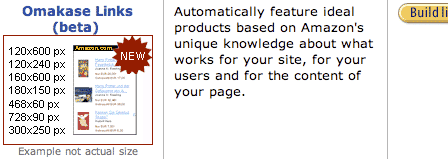Omakase 04 Oct 2006
8 comments Latest by RH Winslow
Omakase is the Japanese word meaning “entrust” or “protect,” according to Wikipedia. It is usually used at sushi bars and means the customer gives the chef authority to prepare whatever the chef wants at a price set by the chef.
Ordering omakase can be a gamble, however the customer typically receives the highest quality fish the restaurant currently has in stock at a price cheaper than if it was ordered a la carte.
The customer puts faith in an expert to make the right decision — freedom of choice is traded for optimization. Ties in with our talk of avoiding preferences (see Getting Real). Sometimes by removing choices from customers you’re doing them a favor. You’re declaring yourself an expert who will serve them the right “fish.”
Omakase and simplicity
John Maeda also talks about Omakase in The Laws Of Simplicity:
Perhaps the omakase course is a form of subjection to culinary sadism — a gastronomic deviance that faces extinction in a progressively risk averse world. A sushi Master does not acknowledge risk; he has no fear. He has earned the trust of his customer, or else will fight literally with his bare hand to earn it when given the opportunity. Simplicity is achieved through the heroism of the trusted Master because in his sushi, we trust.
Amazon’s Omakase Links
And Amazon is now offering Omakase Links — Dave Taylor review, FAQ at Amazon (associate login required) — which “automatically display the products and content that visitors to the page are most likely to buy.” Omakase is designed to compete with Google’s AdSense program by using the built-in advantage of Amazon purchasing and browsing history.
After a short learning period, the ads will be optimized based on what the Associate has been successful with in the past; what that user has been interested in; and what the site is about.

8 comments so far (Jump to latest)
Dave Rau 04 Oct 06
Super cool concept, I’ve never heard of that before. Wouldn’t it be interesting to approach experts in a variety of fields and give them your problem and let them solve it. It’s also quite an interesting way to try new things and with an open mind you’ll get something much better than if you tried to come up with something on your own. Love the idea!
Marc Hedlund 04 Oct 06
I love this. I find omakase ordering works a lot better when you know the chef a bit — if it’s a restaurant you frequent, especially one where you tip well. Then they know a little about your orders, how much you like to eat, and what you don’t like, and can craft a meal around that.
My favorite way to order sushi. At the right place, that is.
Geoffrey 04 Oct 06
The tasting menu is usually the best part of any restaurant. Not only do you get the element of surprise, but you gain the respect of the chef. In the restaurants I’ve worked in, when the customer says “Have the chef put something together for us.” that customer is treated well. They’re saying “You’re the pro, do your thing, and have fun. I trust you.” Good chefs love this attitude and they like to meet the challenge. Sure, it helps if the restaurant itself has a good reputation—even better if you are a regular—but this approach to dining is refreshing in an age where people go out, not to eat, but to be served. The whole have it your way concept is tired.
Jim 04 Oct 06
I second Geoffrey’s comments. In fact, my worst culinary experiences are generally at a buffet table. You dump a lot of stuff you think you want on your plate and somehow it never comes out quite right.
That said, the omakase experience only works in the hands of the right “chef.” In the wrong hands, you end up with the Microsoft “smart” approach, where the chef (okay, application) thinks it knows what’s best for you but is more often than not dead wrong.
Zelnox 05 Oct 06
The comparison with Microsoft doesn’t seem to fit in this situation, because of the broader audience. The chef who will cook omakase is a real expert in his cuisine, a narrower section in Cooking. If one visits a French restaurant and hand the reins over to the chef, not many people will expect say sushi. It is possible, but not as probable.
John A. Davis 05 Oct 06
I walked into McDonalds and I said “Omakase”!
They thought I said “Oh my gosh!”